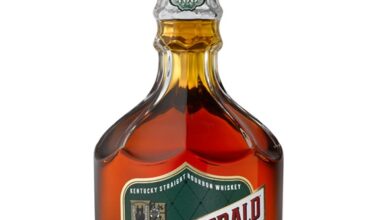Think A Euro Tax On Bourbon Would Be A Good Thing? Guess Again.
By Richard Thomas

(Credit: Wikimedia Commons)
Response to the news that the European Union might retaliate against Donald Trump’s populist proposal to impose protectionist tariffs on steel imports with duties on American bourbon has come in two flavors: critics of Trump singing a chorus of “there he goes again;” and those who somehow think higher prices in Europe would be a good thing for bourbon consumers at home. The latter point of view is about as wrong as it possibly could be.
The logic that EU retaliation against American whiskey would be a boon for consumers is simple, if simplistically flawed: if whiskey isn’t selling over there, they’ll bring it back here. The first and most obvious reason a sales slump in Europe would do little or nothing to help plump up supplies for American consumers is that Europe and almost all of the rest of the world uses 700 ml bottles, not the 750 ml bottle standard in the U.S. “Bringing that whiskey home” would, for the most part, entail rebottling it to comply with Federal regulations, and I guarantee you that Beam-Suntory, Kirin, Sazerac, Campari and the other parent companies of big American whiskey would rather ship the slack to other countries on the 700 ml standard than do that. Blanton’s Gold Label would go to consumers in Japan and Singapore, not Ohio and Florida.
But that would only be in the short term. If a trade fracas were to continue past a year or two, the industry would indeed likely respond by transferring the surplus to the domestic market. The question then becomes how much of a difference would it really make. Not much, because the overwhelming majority of premium and super premium bourbon and other American whiskeys already stay in the American market.
Just for the sake of argument, imagine that a European sales slump caused a shift of stock for W.L. Weller 12 Year Old, and the supply in the United States grew by 2%. What the croakers desire is a return to that short, transitional period of time when well-aged, high quality bourbon was readily accessible and at the recommended retail price. Bringing all the Weller 12 in Europe back to America isn’t going to make that happen, not by a mile.
What absolutely would happen is that said trade war would take a big bite out of the $1 billion in whiskey the U.S. exports every year by making mass market products uncompetitive. Big Bourbon is counting on expanding foreign sales to continue their business boom even after the market expansion in the U.S. plateaus, so seeing the largest part of that market tank, reducing their annual profits by a substantial margin, could mean the end of the Bourbon Boom. Investments in expansions would be canceled, postponed or slowed, because no one in the industry wants to be sitting atop a lake of whiskey they can’t sell and millions of dollars worth of new infrastructure they have no use for.
If that scenario seems alarmist, consider that half of Big Scotch did exactly the same thing because just China imposed broad tariffs on luxury imports, including their whiskies. Compared to the EU, the current Chinese market is peanuts.
Make no mistake: the EU taking a swipe at bourbon isn’t going to bring a sought after whiskey back to store shelves in your city, but it could make that whiskey even scarcer several years down the road.




